Psoriasis is a chronic, non-infectious, inflammatory skin lesion that negatively affects the quality of life of patients (translated from the Greek "Psora"). The first observations of psoriasis, like many other diseases, are described from there. The term was coined by Galen, one of the leading researchers in medicine.
Pearl skin symptoms caused confusion among people and doctors, because at that time leprosy was widespread and the consequences were severe. Pearl patients were subjected to social pressure, avoided, and forcibly isolated. In Europe, such people had to call and warn others of their arrival. Treatment attempts were to use fertilizer, onions, sea salt, oil, urine, but all were ineffective and expelled the psoriasis patients.
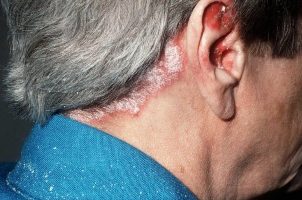
PSORIYAZIN PREVALENCE
The disease can appear at any age, but is more common in the age group of 49 to 69 years. The prevalence of psoriasis in the country varies from 0. 09% to 11. 4%, which makes psoriasis a serious global problem.
Despite widespread misconceptions that psoriasis is not as serious as other non-dermatological pathologies, psoriasis creates a disease burden that extends far beyond dermatological symptoms. Psychological effects are similar to cancer, heart disease, diabetes. Psoriasis plaques often appear, which can negatively affect interpersonal relationships, school, or work success. Not surprisingly, patients with psoriasis have a higher rate of depression as the number of suicidal thoughts increases.
Psoriasis patients are also at risk of developing serious co-morbidities that will complicate disease control and increase the risk of early death. Cardiovascular disease and metabolic syndrome are more common in patients with psoriasis.
In addition, psoriasis itself is a risk factor for cardiovascular disease and triples the relative risk of developing myocardial infarction. Severe psoriasis is also associated with an increased risk of death, leading to a reduction in life expectancy of 3, 5, and 4 to 4 years for men and women compared to people without psoriasis.
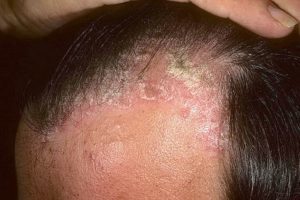
THE CAUSE OF PSYRIA IN THE BEGINNING
There are many theories about the origin of psoriasis. These are the effects of germs, viruses, allergies, poor hygiene, impaired blood supply to the skin, dysfunction of the internal organs, and one of the most pressing at the moment - the disease when human immune cells attack their own tissues. And this hypothesis remains such a theory, because to date, no antibodies have been found to damage the skin in patients with psoriasis.
The cause of the pathology is currently unknown. However, in the course of research, scientists have identified the factors that can cause psoriasis with a certain probability.
The following points are highlighted:
- Heredity. Although both parents are sick, it is unlikely that their child will suffer from psoriasis. However, in such a situation, the risk of getting such a pathology is higher. It was also noted that if one of the same twins was ill, the second twin was more likely to become ill than the usual risk in the population. This proves that this nosology has a genetic precondition.
- Skin damage: Accidental knife cuts, cat scratches, mosquito bites, sunburn increase the risk of another disease.
- Infections: Staphylococcus, streptococcus and other infections can also act as triggers. Streptococcal tonsillitis often occurs in children before the onset of psoriasis.
- There are drugs that trigger the disease, such as anti-malarial drugs, some anti-depressant drugs.
- Changing your HIV status positively can also boost psoriasis. Therefore, testing for HIV when psoriasis is suspected is not uncommon.
- Stress. The most popular trigger for the unemployed. "Everything is due to stress" - every psoriasis patient has heard this phrase at least once. Some people are skeptical, but they have their reasons. Scientists believe that in addition to physical defects such as trauma and infection, our immune system can also respond to emotional and mental stress.
- Excess weight negatively affects the entire body system, and if an obese person has a history of psoriasis, treatment is more difficult and often less effective.
- Smoking. It has long been known that smoking has a negative effect on the condition of the skin. Thus, the possibility of provoking psoriasis, especially the head and hands are damaged.
- Alcohol is one of the common individual triggers for psoriasis.
- Hormonal changes. The disease often manifests itself during adolescence. Menopause can also trigger psoriasis, but there is a reduction or even complete regression of plaques during pregnancy.
SIGNS OF PSORIES IN THE BEGINNING
In 50% of cases, psoriasis is felt from the beginning. Pearls can appear anywhere on the head. Sometimes small plaques form on the hair that are easy to hide, but it is difficult to hide the plaques when the entire scalp is covered.
Appearance at the top of the shell will look like this:
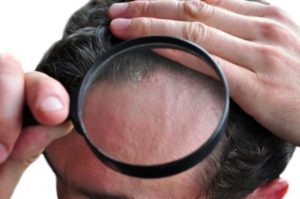
- Red spots on the scalp. Some spots may be subtle as they fade, but there are also bright red elements that are easy to see.
- Psoriasis scales. In this pathology, the condition of the scalp is similar to normal dandruff. However, there are differences, so, for example, with psoriasis, a silvery sheen is observed and may be accompanied by itchy skin.
- Dry scalp. The scalp can be so dry that the skin cracks and bleeds, which will create the conditions for the addition of an infection that causes certain difficulties in treatment in such a localization.
- Itching. This is one of the most common symptoms. Some people experience a mild itch that the patient can forget about in their daily activities, while others experience such severe itching that it is impossible to work, read, or even sleep.
- Bleeding. Because psoriasis of the scalp can cause itching, the patient may scratch or damage the skin. In addition to bleeding, scratching can make the plaque bigger and denser, worsening the course of psoriasis. That's why dermatologists tell patients to "try not to damage the scalp. "
- Burning. The patient can describe the scalp as "burning".
- Hair loss. Scrubbing the scalp, applying force to lift the scales can cause hair loss. Although this phenomenon is temporary, it can cause discomfort to the patient.
These clinical manifestations can both increase and decrease. This is an individual process. In one patient, the whole pathological process will end in a pale plaque under the hair, while the other will have many bright spots all over the head. This is affected, among other things, by the triggers described above.
A number of problems that the patient may face:
- Skin manifestations are visible to others. Living with psoriasis can be embarrassing. Any aspect of social life can be stressful for these people, such as holding hands in a meeting.
- Finance. Treating psoriasis can be expensive. Prolonged psoriasis, which is resistant to traditional therapy using new drugs based on monoclinic antibodies, is more accurate.
- Pain. Chronic pain can occur with psoriasis, which further increases stress levels. This is especially true when skin manifestations are combined with inflammation of the joints and reduce a person's daily activities.
- Healing. Especially when the patient asks for help late, some procedures do not have the expected effect, which, of course, worries the patient and emotionally oppresses him. Other procedures can take a long time. For example, you may need to receive phototherapy 3 times a week for up to a year. For some, such a regime will be difficult to adapt to the standard rhythm of life.
- Living with a chronic illness. Psoriasis, like many other chronic pathologies, requires great voluntary effort. It is difficult for the patient to cope with a number of additional problems, especially in the early stages. This can lead to depression.
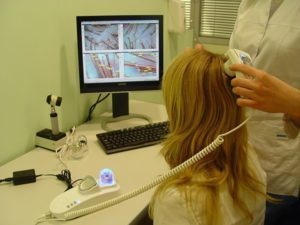
DEFINITION OF PSYRIA IN THE BEGINNING
Whether or not to see a doctor depends on the severity of the symptoms. However, regardless of the location of the plaques, the best solution would be to consult a doctor. For additional treatment to be as successful as possible, an accurate diagnosis must be made, even if the symptoms are mild.
In most cases, scalp psoriasis is diagnosed after a physical examination and medical history analysis.
A dermatologist can diagnose scalp psoriasis by examining the pathological elements of the skin.In exceptional cases, the patient may be advised to undergo a skin biopsy to rule out other diseases.
TREATMENT OF PSORIES IN THE BEGINNING
Unfortunately, there is currently no cure for this disease. Therapy is required for life and is aimed at maintaining remission. In addition, care for psoriasis patients requires not only skin treatment, but also control of existing chronic diseases and prevention of new ones.
These conditions will include cardiovascular disease, metabolic disease and mental health.
Treatment goals:
- To achieve clinical improvement of the patient as soon as possible;
- Remission should be stable and long-lasting;
- Maintaining the patient's positive psychological state.
Dietary food
Treatment traditionally begins with diet. Foods rich in vitamins C, E, beta-carotene (antioxidants) (vegetables, fruits, sage, ginger, etc. ), as well as omega-3 fatty acids rich in salmon, sardines and other fish can also play a positive role.
The link between alcohol and psoriasis is unclear, but experts say drinkers are less likely to respond to treatment and psoriasis remissions are longer after not drinking alcohol. In addition, some antipsychotic drugs are incompatible with alcohol.
There is a clearer correlation with excess weight. In obese people, as a rule, the pathology progresses faster with a brighter clinical picture.
SHAMPOO
Hair makes scalp psoriasis especially difficult to treat. Few are willing to have their hair removed in order to deal more effectively with the clinical manifestations of the disease, especially given that the defects will be more noticeable to others.
Conventional hair care products are not suitable in this situation, as they can further irritate the scalp, contributing to the development of pathology. Therefore, tar shampoos have long been used in the fight against scalp psoriasis.
Tar has a "soothing" effect on the epidermis of the scalp, preventing the formation of scales. In addition, shampoos containing phenolic acid are used because they have a keratolytic effect (destroys dense horn scales). Plus, it is used to boost the reputation of other medications, including corticosteroids.
When determining the shampoo, hair hygiene takes into account the individual characteristics of a person. For example, some women do not wash their hair every day, so it is best to apply the solution to their hair 2-3 times a week before going to bed, and then wash their hair in the morning.
PHENOLIC ACID
Phenolic acid can also be used as an ointment. Relatively long-term application of the ointment increases the effectiveness of hyperkeratic properties. For patients who complain of difficulty in separating the scales from the hair, applying an ointment before the shower can help solve this situation.

COAL CUTCHER
Charcoal resin has been used as a treatment for psoriasis for decades due to its antiproliferative, anti-inflammatory and strong antipruritic effects.
However, raw coal tar is the most effective resin. Applying raw stone resin to the scalp is problematic. It is generally recommended to use a resin solution (5-20%) prepared in the form of a lotion or added to corticosteroids. This tool helps to fight psoriasis, but there are a number of side effects: coloring, thinning hair and more serious side effects - carcinogenic because the use of this method is limited.
For example, coal tar is banned in Canada and the European Union for this reason.
Corticosteroids
Of the available topical treatments, corticosteroids have been shown to be the most effective and most commonly prescribed treatments for scalp psoriasis in clinical trials. Corticosteroids are also convenient, as there are many production forms for each situation: creams, lotions, ointments, oils, gels, foams, solutions, sprays and shampoos.
Do not underestimate the importance of psychological harmony in this pathology. Stress can be both a trigger and a detailed clinical picture, but also hinders the healing process. Therefore, patients with internal disorders are advised to consult a psychotherapist, psychologist.
SUGGESTIONS AGAINST GENERAL PSORIOSIS
It is important for a psoriasis patient to follow the doctor's recommendations first of all, but you can still improve your quality of life by following the simple rules explained below:
- Use moisturizing lotions. Skin manifestations of the disease worsen significantly when the skin is dry, so it is important to keep the skin moist. Special cosmetic ointments, lotions or, for example, ordinary petroleum jelly can help.
- Take good care of your skin with psoriatic plaques. When washing your hair, forcibly peel off the scales, which are never tight to the skin, because you can only spread the process to nearby healthy tissues.
- Be careful when cutting your nails. Cases of accidental damage to the growth zone of the nail with manicure scissors provoke the appearance of new skin elements.
- Find a suitable shampoo that won't break your skin for use on your scalp during remission. Or continue to use a small amount of tar for daily care.
- Climate can also play a role. It is noteworthy that the cold has a negative effect on patients, causing the development of plaques. Sunny weather causes regression of skin manifestations, but not always.
- Use a moisturizer. This can keep the skin hydrated and eliminate harmful dry air for psoriasis patients.
- Do not take medications that can damage your skin. You should inform your doctor about any medications you are taking, even those that you think are harmless. For example, drugs containing lithium salts, which are contraindicated for patients with psoriasis, can be used to treat a depressive condition.
- Avoid any damage to the skin: scratches, cuts, bumps. Skin damage can lead to a condition called Koebner's phenomenon (when psoriatic elements develop along the line of skin damage). Be careful when shaving. Avoid acupuncture, do not get tattoos on your body and do your best to prevent insect bites.
- Try to be visible in the sun, but in moderation. Ultraviolet rays in sunlight slow down the growth of skin cells, so it is better to take a moderate dose of ultraviolet light (30 minutes each time is enough). Paradoxically, excessive sun exposure can cause psoriasis. Also, keep in mind that some medications can make your skin more sensitive to ultraviolet rays.
- Patients with psoriasis should reduce their anxiety levels. Of course, this is easy to say, but relaxation techniques such as meditation or yoga can be tried.
- Estimate how much alcohol you drink. The link between alcohol and psoriasis is unclear, but scientists still believe it can worsen symptoms, especially in men. It is well known that alcohol is dangerous when combined with certain psoriasis medications.
- Balance your diet and try to lose weight. If this is difficult to do yourself, seek the help of experts who can assess which direction is best for you.

RECOMMENDATIONS FOR THE CONTROL OF THE EXTRACTS AT THE BEGINNING OF PSORIA
By monitoring the progress of psoriasis, you can help the patient better manage his illness and take the necessary measures in a timely manner, while increasing the productivity of the doctor-patient relationship. Here are a few simple rules to help you:
- Create an "own portrait" of psoriasis. A digital camera, smartphone, or just a piece of paper that can record all the changes with the boards will help you in this task. It is worth noting where the changes first appear and in what order they increase. For such a review, the doctor will only praise you and know that you are determined. Over time, it is possible to identify patterned situations by analyzing records, for example, an epidemic always begins with a plaque on the occiput.
- Every time psoriasis goes down or develops, try to find out what it is. Maybe the weather has changed? Is the medicine over? Are you taking a new medication? Recently damaged skin? Such triggers can be individual, which makes it difficult for the doctor to understand without examining the patient (for example, the
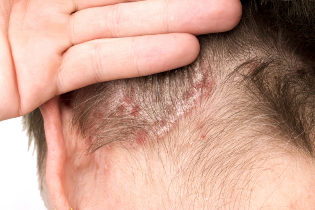 attack causes a certain type of coffee).
attack causes a certain type of coffee).
Although the disease does not pass through contact, the appearance of patients frightens those who do not know. Beauty salons are afraid to serve, some taxi drivers do not want to carry such people, it is difficult to get a job. I'm not talking about getting married, and the fear that their children will suffer the same fate prevents them from having children.
In response to the collective complaints of other athletes, cases of people with psoriasis being denied access to the Olympic swimming pool have also been described. Despite realizing that this pathology was not dangerous in a contagious sense, the leadership had to reject such people.
It is difficult for them to engage in daily activities because the burden of psychological pressure is high and a person needs social contact. For these reasons, societies are being established in many countries to protect and support psoriasis patients. Companies are set up to inform foreigners about the disease.
People should be judged by their deeds, not by their appearance. Indeed, among patients with such a nosology are highly professional doctors, police, firefighters, athletes, and others whose actions can make not only their relatives but also their countries proud.
























